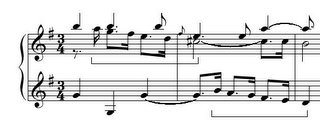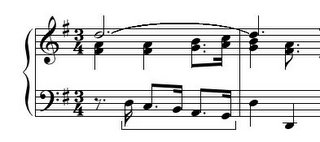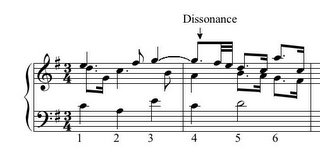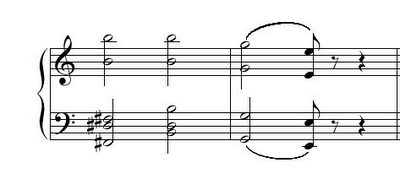To be fair, I don't think this blog was meant to be read "for pleasure."
For you non-music types: Form & Analysis is a REQUIRED COURSE for all "serious" music students at the Conservatory, something like Anatomy for medical students, except for the fact that the skeletons of music theory have almost no basis in any kind of observable reality. (I said "almost"! But I "almost" deleted it.) So while it may be useful for a doctor, say, to know the heart has a certain number of ventricles, musicians find themselves wondering why they need to know whether a section of a particular Chopin Mazurka is "terminative" or "developmental." I am sounding terribly cynical on this Christmas morning; it is hard, I admit, to think of the baby Jesus as a music theorist, promising perfect authentic cadences in exchange for our sins (although in a way that is exactly what happens). And as you know I am actually a HUGE FAN of musical analysis, and I wouldn't have brought up this mean-spirited topic at all except for one student's little acts of revolution, which made me smile so very, very much.
Self-named "Snoop," presumably one of the students, analyzes the Chopin Mazurka in e minor, Op. 17 #2. He begins in the traditional manner, carving up the pie heartlessly into pieces:
The piece is ternary - mm. 1-24 are the first A section, mm. 25-52 are the B section and the second A section is mm. 53 to the end.
Yawn. I was at the point of scrolling to the next analysis (why, oh why, on Christmas morning was I reading these at all?) But the beginning of the next paragraph arrested my scroll:
The first section is expository, like the beginning of most pieces.
I love these moments, when students bump themselves against the fairly obvious idiocies of music theoretical jargon; they bang their heads and wonder "is that all there is to say, other than putting it in fancier words?" Perhaps they don't realize that at that very moment of pain and frustration they should scratch their bruised heads and look around; they are lost in the vicinity of truth. What tickles me about this little sentence is that I can't quite tell whether the student is being sarcastic or not. I like to assume he/she is. You see, a great object of Form and Analysis is the reduction of vocabulary. Instead of whatever words the student comes up with, the textbook comes up with a limited set of words, which can be used "objectively," so that the wishy-washy notions of the student can be measured. A great premium seems to be placed on making these words as heartless and scientific-sounding as possible, so that the student can experience the maximum disillusionment and pain in reducing his/her musical experience into them. Section B: is it "expository" or "developmental"? It's gotta be one or the other. Choose, now!!! I can see this battle at work in the following passage from Snoop's analysis:
In that sense, the B section could be considered to have developmental function - it starts off with previous motivic material, or at least a melody that is very similar. However, the second part of the B section (mm. 39-52) seems more like a transitional section, in that there's a lot of agitation and harmonic activity. Basically, it's a stretched-out, undulating passage that goes through lots of chords and eventually ends on the dominant, which leads into the return of the A section.
Snoop is trying to choose between "developmental" and "transitional" to describe this B section, both of which terms presumably are elucidated in the text. But between these generic terms, poor Snoop can't help using more evocative ones: "agitation," "stretched-out," "undulating." Danger, danger! Luckily, he is able to bring this veering ship to shore, with words like "dominant" and "A section." A term like "harmonic activity" straddles this divide interestingly: it suggests something intriguing, some kind of unusual event; and yet it describes it in the most nonspecific possible manner ...
Finally, Snoop delivers the coup-de-grâce:
The second A section has a terminative function - the extension to the final cadence reinforces the tonal center, which is the primary attribute of terminative sections, according to the text.
"According to the text"!!!!!! Fantastic, Snoop. Now that's good stuff. What is this mysterious "text" to which the student refers? Presumably a book wherein "terminative sections" are defined. I'm sure all you readers, even the ones who are bored stiff by this whole post, can see how asinine it is to use a term like "terminative." (Not just to use it, but to force it as a generic term for every analysis.) The connotations and associations are horrendous (termination, terminator, California, death, term papers, term limits, bringing to term, terminology, oy); and like expository it could be seen as just a fancier, uglier, meaner way of saying "ending." And how tersely Snoop draws our attention to the reductive nature of this unspecified text! Reinforcing the tonal center is the "primary attribute" of terminative sections? Oh, REALLY? Magnificent, transcendent codas pile themselves into my mind one after the other; the endings of Beethoven Sonatas, the "Waldstein" Sonata, Op. 110, the final passage of the first movement of the Schumann Fantasy... and on and on. Life-changing conclusions which, while ending in the same old home key, leave everything else (connotation, meaning, affect) completely altered. But wait! this is not Music Theory.
"According to the text." But not, perhaps, according to Snoop. Snoop delivers his skepticism in a little verbal pill, at once deferential and destructive, a bomb cleverly written in the very language of conformity ("According to Hoyle," the gospel according to X, etc.) As I write this, I begin to wonder if Snoop intended this double meaning at all, whether I might be over-reaching. Haha. The muffled, affirmative snickers of blogreaders reach me even here. I have even gone so far as to muse on Snoop's signature, "word out": is it really a commentary on the nature of words, as applied to music? Really: kidding.
This post would seem to be an attack on Music Theory, but it most definitely isn't. When I posted, a little bit ago, about the condescending tone of a particular concert review, I haplessly tapped into some deep-seated anti-critic sentiment, which I perused in the Comments section. Wow! Let me be clear: I disassociate myself from those comments (critics as frustrated performers, etc.) I feel sure that there will be some anti-theory people out there too, who may jump on my bitter bandwagon. But I want to preach a more positive Yuletide gospel. I do not feel that "talking about music is like dancing about architecture;" actually, I have always detested that quote, which I consider to be patently untrue. Moreover, I think dancing about architecture would be a very interesting thing to do. Let's imagine the baby Jesus, analyzing the song of the Magi. I think he would love and tolerate talk of cadences, even Schenkerian diagrams. Why do I imagine him treating theorists as he did Mary Magdelene? This suggests a conception of theory as a particularly unsexy form of prostitution. No, wait, I can do better: the expectancy of the Christmas ritual, the presents wrapped under the tree, the smell of the tree, the candles, the late night, the early morning awakening, stumbling out to the family room in your pajamas, getting ready to convert the whole beautiful waiting thing into a storm of crumpled paper. Sometimes it seems Theory wants you to unwrap the gift, but not to see what's inside. It is cold-hearted: it wants you to "understand" expectancy. But I assure you, Theory for all its jargon wants you to receive music's gift too; to receive with gratitude the ingenuity of the composer, the generosity of invention, to appreciate the process of composition, a kind of wrapping and unwrapping of the human spirit. That is why, finally, we suffer through Form and Analysis. Mr. Spiegelberg's students seem to be in good humor about the whole thing, interjecting irony, sarcasm, etc., which is a victory for both student and teacher.
I myself have caught the Christmas spirit lately too. I released something and allowed in myself the (imagined) possibility of light-heartedness (which I didn't know I had forbidden), and somehow then the external world complied and "real" light-hearted things came into it, flooding my weird days. Yesterday (I am not kidding) I was thinking through the form of Op. 110 with a joyous spring to my step. Perhaps the danger is the conflation of Music Theory's terms with the real. And is the music itself any more "real" than the Theory it has created, like a monster? Let's toss reality and truth aside, and Merry Christmas.













